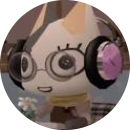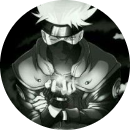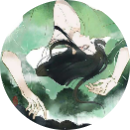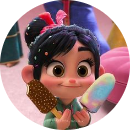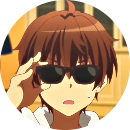part 2

Những câu hỏi liên quan
Read part 2 of the article. Why is Apollo 13 mission described as a successful failure? Rewrite the underlined clauses in part 2 as participle clauses.1 ... fitted with its own oxygen tank...PART 2The astronauts left the main part of the spaceship and went inside the lunar module, 1which had been fitted with its own oxygen tank. But inside the smaller module, 2which was designed to hold only two people, carbon dioxide levels started rising. The astronauts, 3 who had been following instructions f...
Đọc tiếp
Read part 2 of the article. Why is Apollo 13 mission described as a 'successful failure'? Rewrite the underlined clauses in part 2 as participle clauses.
1 ... fitted with its own oxygen tank...
PART 2
The astronauts left the main part of the spaceship and went inside the lunar module, 1which had been fitted with its own oxygen tank. But inside the smaller module, 2which was designed to hold only two people, carbon dioxide levels started rising. The astronauts, 3 who had been following instructions from the ground crew, made special filters out of plastic bags and cardboard. Then they waited in the cold and dark while the ground crew, 4 who were working 24 hours a day, tried to work out a way to bring them home. If some people in America were losing interest in the Space Program, the Apollo 13 crisis, 5 which was discussed on all the TV news programmes, changed all that. The astronauts 6 who were risking their lives and the people 7 who were trying to save them all became national heroes - especially when Apollo 13 returned safely to Earth with all three astronauts alive.
2 which was designed to hold only two people
=> designed to hold only two people
(được thiết kế để chỉ chứa hai người)
3 who had been following instructions from the ground crew
=> following instructions from the ground crew
(làm theo hướng dẫn của nhân viên mặt đất)
4 who were working 24 hours a day
=> working 24 hours a day
(làm việc 24 giờ một ngày)
5 which was discussed on all the TV news programmes
=> discussed on all the TV news programmes
(được thảo luận trên tất cả các chương trình tin tức truyền hình)
6 who were risking their lives
=> risking their lives
(mạo hiểm tính mạng của họ)
7 who were trying to save them
=> trying to save them
(cố gắng cứu họ)
The Apollo 13 mission is often described as a 'successful failure' because while the mission did not achieve its primary goal of landing on the moon, the mission became a triumph of human ingenuity and teamwork in the face of crisis. Despite the explosion that damaged the spacecraft and the many challenges faced by the crew and the ground crew during the mission, all three astronauts returned safely to Earth, thanks to the remarkable efforts of everyone involved.
(Sứ mệnh Apollo 13 thường được mô tả là một "thất bại thành công" bởi vì mặc dù sứ mệnh không đạt được mục tiêu chính là hạ cánh trên mặt trăng, nhưng sứ mệnh này đã trở thành một chiến thắng của sự khéo léo của con người và tinh thần đồng đội khi đối mặt với khủng hoảng. Bất chấp vụ nổ làm hỏng tàu vũ trụ và nhiều thách thức mà phi hành đoàn và nhân viên mặt đất phải đối mặt trong nhiệm vụ, cả ba phi hành gia đã trở về Trái đất an toàn nhờ những nỗ lực đáng kể của mọi người tham gia.)
Đúng 0
Bình luận (0)
Choose the words whose underlined part is pronounced differently 1.brothers 2.letters 3.hats Choose the words whose underlined part is pronounced differently 1.chairs 2.books 3.pictures Choose the words whose underlined part is pronounced differently 1.parents 2.fathers 3.sisters Giúp mình với ạ (Âm s nhé Mn)
Choose the words whose underlined part is pronounced differently
1.brothers 2.letters 3.hats
Choose the words whose underlined part is pronounced differently
1.chairs 2.books 3.pictures
Choose the words whose underlined part is pronounced differently
1.parents 2.fathers 3.sisters
Đúng 1
Bình luận (1)
3.hats
2.books
1.parents
(mình thấy mấy câu này đều có 2 từ đã là âm r cuối rồi mà..)
Đúng 1
Bình luận (0)
A book comes in three parts . Part 1 has 2016 pages. Part 2 has 1570 pages . Part 3 has 1830 pages. How many pages are there altogether? (giải bằng tiếng anh)
A book comes in three parts . Part 1 has 2016 pages. Part 2 has 1570 pages . Part 3 has 1830 pages. How many pages are there altogether?
There are pages numbers:
2016 + 1570 + 1830 = 5416 ( pages )
That book has 5416 pages
Sai thì thui đưngf mắng mik nhé mk cx không giỏi tiếng anh lắm đâu >.<
Đúng 0
Bình luận (0)
PART I: Choose the word which has the underlined part pronounced differently from the others. 1. A. eitherB. authorC. bothD. worth 2. A. watchedB. visitedC. lookedD. stopped PART II: Choose the sentence that best combines each pair of sentences in the following question.3. The traffic was bad. We arrived on time. A. We arrived on time although the traffic is bad.B. Though the traffic was bad, we arrived on time.C. We arrived on time despite...
Đọc tiếp
PART I: Choose the word which has the underlined part pronounced differently from the others.
1. A. either
B. author
C. both
D. worth
2. A. watched
B. visited
C. looked
D. stopped
PART II: Choose the sentence that best combines each pair of sentences in the following question.
3. The traffic was bad. We arrived on time.
A. We arrived on time although the traffic is bad.
B. Though the traffic was bad, we arrived on time.
C. We arrived on time despite of the bad traffic.
Although the fact that the traffic was bad, we arrived on time. 1. A. either
D. author
E. both
F. worth
2. A. watched
G. visited
H. looked
I. stopped
J.
4. A supermarket is quite convenient. A shopping centre is much more convenient.
A. A supermarket is the most convenient as a shopping centre.
B. A supermarket is less convenient than a shopping centre.
C. A supermarket is less convenient as a shopping centre.
D. A supermarket is not so convenient a shopping centre.
5. They are looking for the man and his dog. They have lost the way in the forest.
A. They are looking for the man and his dog which have lost the way in the forest.
B. They are looking for the man and his dog of which have lost the way in the forest.
C. They are looking for the man and his dog who have lost the way in the forest.
D. They are looking for the man and his dog that have lost the way in the forest.
PART III: Choose the sentence that is closest in meaning to the following question.
6. They are not allowed to go out in the evening by their parents.
A. Their parents do not want them to go out in the evening.
B. Their parents never let them go out in the evening.
C. Going out in the evening is permitted by their parents.
D. Although their parents do not allow, they still go out in the evening.
7. Please arrive early because we want to be able to start our meeting early.
A. Please arrive early so that we can start our meeting early.
B. Please arrive early so that we were able to start our meeting early.
C. Please arrive so early that we could be able to start our meeting early.
D. Please arrive early for us to be able to start our meeting early.
8. She wasn't early enough to catch the bus.
A. She wasn't late for the bus.
B. She arrived too early for the bus.
C. She didn't arrive late for the bus.
D. She was too late to catch the bus.
PART IV: Choose the sentence that completes the sentence from the suggested words or phrases.
9. He/ prefer/ go out/ friends/ rather than/ stay/ home/ alone.
A. He would prefer going out with his friends rather than staying at home alone.
B. He prefer going out with his friends rather than staying at home alone
C. He prefer to go out with his friends rather than to stay at home alone.
D. He would prefer to go out with his friends rather than stay at home alone.
10. I/ thought/book/worth/read/but/it/not.
A. I thought this book was worth to read but it isn't.
B. I thought this book was worth reading but it wasn't.
C. I thought this book is worth reading but it wasn't.
D. I thought this book is worth to read but it doesn't.
11. Language/ music/ be/ two things/ make/ human/ different/ all other animals.
A. Language and music are two things that make human different from all other animals.
B. Language and music are two things that making human different from all other animals.
C. Language and music is two things that make human different of all other animals.
D. Language and music are two things that makes human different from all other animals.
PART V: Choose the underlined part that needs correction.
12. My father, along with his friends, are drinking tea in the living room.
A. along with
B. are
C. tea
D. the
13. He lives in the district eastern so it’ll take us 3 hours to drive to his house.
A. in
B. district eastern
C. take
D. to drive
14. Jack cycles usually to work to avoid traffic jams at rush hour.
A. cycles usually
B. avoid
C. jams
D. rush hour
PART VI: Choose the best answer.
Question 15
Kate: “_____”
Mary: “Don’t worry about it.”
A. Thank you for inviting me.
B. Sorry for coming late.
C. Could you do me a favor?
D. Do you need any help?
Question 16
Tom: "Why didn’t you pay the telephone bill?"
Lucy: "_____."
A. Well, it’s too thick
B. Thank you for all that
C. Yes, it was true
D. I did
Question 17: Keep silent! My father _____ in his room.
A. is sleeping
B. was sleeping
C. has left
D. will be slept
Question 18: I’m _____ forward to seeing you again.
A. coming
B. going
C. looking
D. bringing
Question 19: The fire was caused by an _____ fault in the television.
A. electricity
B. electric
C. electrician
D. electrical
Question 20: _____ a clock in your classroom?
A. Are there
B. Is there
C. Have there
D. Has there
Question 21: Did you send Alice an invitation _____ the party?
A. to
B. with
C. in
D. of
Question 22: Max goes to bed _____ than anyone I know.
A. the most early
B. earlier
C. the earliest
D. much early
Question 23: My brother didn't feel well. _____, he didn't go to work yesterday.
A. So
B. But
C. However
D. Therefore
Question 24: They were late for work because their car _____ down.
A. got
B. put
C. cut
D. broke
Question 25: We may know the land very well, but we know very _____ about the ocean.
A. few
B. little
C. much
D. lots
Question 26: I first _____ to a rock concert when I was 15.
A. go
B. went
C. have gone
D. was going
PART VII: Read the passage and choose the correct answer for each of the blanks.
Every season there are new clothes and new fashions in the shops. Colours and styles keep (1) change/ to change/ changed/ changing. One season black is the 'in' color, but the next season everyone is wearing orange or pink or grey. The length of women's skirts goes up and down from year to year. A shirt (2) who/ whom/ what/ that you once thought was very trendy can look (3) strangeness/ stranger/ strangely/ strange old-fashioned a few years later. And your father's shirts, you always thought were very conservative and traditional, can suddenly become (4) stylish/ outdated/ old/ useless. Keeping up with the fashions can be very expensive. So one way to save money is never to throw your old clothes out. If you wait long enough, the clothes are out of fashion today will be (5) out/ up/ away/ back in fashion tomorrow. Yesterday's clothes are tomorrow's new fashions.
PART VIII: Read the following passage then choose the best answer to each question below.
So what happened after school?
by Sam Adam
I was wondering what I should do with my life when I finish school. My parents told me that I still had a couple of years ahead of me but that did not reassure me. So I went online and found everything about career advisors.
Most secondary schools in England have members of staff who give career advice to their students. They are called career advisors. A year before they leave school, the career advisors will talk to the students one by one and ask them what they want to do in the future. The advisor will look at the students' grades to see what subjects they are stronger in. For example, if they are good at maths, they can become an accountant.
The advice is not just about the part of finding a job; it's also telling the student what university course they must do first. If a student wants to become a lawyer, he or she will have to go to university for three or four years to study law. However, if someone wants to be a doctor, they will need good grades in biology and other science subjects. With good grades, they can go to university and do their basic medical training which is six years. But their studying doesn’t finish at university. They then have to study at the hospital for another two or three years.
The careers advisor also helps students who don't have the grades to go to university. The advisor helps the students with their CV and shows them how to find and apply for jobs. Sometimes there are short courses they can do to learn a new skill quickly. For example, they can go on a hairdressing course and then learn more while they work. Some organizations offer training on the job, such as factories and farms. The government has many areas which offer possibilities for those who can't go to university. Students can join the army and be trained to become a soldier, or if they want, they could become a sailor with the navy.
So I guess that now I shouldn't be feeling so anxious. When the time comes, I'll make sure I'll ask a careers advisor for help.
(Adapted from Simply B1 Preliminary for School)
Question 28: How do career advisors meet the students?
A. in a small group
B. in individual meetings
C. all the class together
D. the whole school at the same time
Question 29: What does the advisor look for before giving advice?
A. what the student isn't very good at
B. university courses in other countries
C. what the student is better at
D. the student's CV and folder
Question 30: What happens after studying medicine at a university?
A. The student must go on to study biology as well.
B. The student can train others to become doctors, too.
C. The student can practice medicine immediately after.
D. The student carries on learning for another few years.
Question 31: How do advisors help students with not very good grades?
A. They show them the best way to get a job.
B. They help them with on-the-job training.
C. They give extra classes to help them get to university.
D. They take them to a farm and a factory to show them their options.
Question 32: What would Sam text to a friend who seeks career advice?
A. I'm as worried as you are as I don't know what options are available for us.
B. I guess you could ask your parents for help; that's what I did.
C. There is no need to panic as there are people at school that can help you with that.
D. Your teachers will make career decisions for you so that you don't have to deal with it.
PART IX: Choose the word that is different from the rest.
33. A. anything
B. anyone
C. anymore
D. anywhere
34. A. triangle
B. square
C. circle
D. shape
PART X: Choose the word(s) CLOSEST in meaning to the underlined word(s).
35. Katty is a little nervous about leaving the kids at home all alone.
A. serious
B. pleased
C. worried
D. difficult
36. According to a recent newspaper article, the company is worth over $20 billion
A. sentence
B. writing
C. title
D. report
PART I: Choose the word which has the underlined part pronounced differently from the others.
1. A. either
B. author
C. both
D. worth
2. A. watched
B. visited
C. looked
D. stopped
PART II: Choose the sentence that best combines each pair of sentences in the following question.
3. The traffic was bad. We arrived on time.
A. We arrived on time although the traffic is bad.
B. Though the traffic was bad, we arrived on time.
C. We arrived on time despite of the bad traffic.
Although the fact that the traffic was bad, we arrived on time. 1. A. either
D. author
E. both
F. worth
2. A. watched
G. visited
H. looked
I. stopped
J.
4. A supermarket is quite convenient. A shopping centre is much more convenient.
A. A supermarket is the most convenient as a shopping centre.
B. A supermarket is less convenient than a shopping centre.
C. A supermarket is less convenient as a shopping centre.
D. A supermarket is not so convenient a shopping centre.
5. They are looking for the man and his dog. They have lost the way in the forest.
A. They are looking for the man and his dog which have lost the way in the forest.
B. They are looking for the man and his dog of which have lost the way in the forest.
C. They are looking for the man and his dog who have lost the way in the forest.
D. They are looking for the man and his dog that have lost the way in the forest.
PART III: Choose the sentence that is closest in meaning to the following question.
6. They are not allowed to go out in the evening by their parents.
A. Their parents do not want them to go out in the evening.
B. Their parents never let them go out in the evening.
C. Going out in the evening is permitted by their parents.
D. Although their parents do not allow, they still go out in the evening.
7. Please arrive early because we want to be able to start our meeting early.
A. Please arrive early so that we can start our meeting early.
B. Please arrive early so that we were able to start our meeting early.
C. Please arrive so early that we could be able to start our meeting early.
D. Please arrive early for us to be able to start our meeting early.
8. She wasn't early enough to catch the bus.
A. She wasn't late for the bus.
B. She arrived too early for the bus.
C. She didn't arrive late for the bus.
D. She was too late to catch the bus.
PART IV: Choose the sentence that completes the sentence from the suggested words or phrases.
9. He/ prefer/ go out/ friends/ rather than/ stay/ home/ alone.
A. He would prefer going out with his friends rather than staying at home alone.
B. He prefer going out with his friends rather than staying at home alone
C. He prefer to go out with his friends rather than to stay at home alone.
D. He would prefer to go out with his friends rather than stay at home alone.
10. I/ thought/book/worth/read/but/it/not.
A. I thought this book was worth to read but it isn't.
B. I thought this book was worth reading but it wasn't.
C. I thought this book is worth reading but it wasn't.
D. I thought this book is worth to read but it doesn't.
11. Language/ music/ be/ two things/ make/ human/ different/ all other animals.
A. Language and music are two things that make human different from all other animals.
B. Language and music are two things that making human different from all other animals.
C. Language and music is two things that make human different of all other animals.
D. Language and music are two things that makes human different from all other animals.
PART V: Choose the underlined part that needs correction.
12. My father, along with his friends, are drinking tea in the living room.
A. along with
B. are
C. tea
D. the
13. He lives in the district eastern so it’ll take us 3 hours to drive to his house.
A. in
B. district eastern
C. take
D. to drive
14. Jack cycles usually to work to avoid traffic jams at rush hour.
A. cycles usually
B. avoid
C. jams
D. rush hour
PART VI: Choose the best answer.
Question 15
Kate: “_____”
Mary: “Don’t worry about it.”
A. Thank you for inviting me.
B. Sorry for coming late.
C. Could you do me a favor?
D. Do you need any help?
Question 16
Tom: "Why didn’t you pay the telephone bill?"
Lucy: "_____."
A. Well, it’s too thick
B. Thank you for all that
C. Yes, it was true
D. I did
Question 17: Keep silent! My father _____ in his room.
A. is sleeping
B. was sleeping
C. has left
D. will be slept
Question 18: I’m _____ forward to seeing you again.
A. coming
B. going
C. looking
D. bringing
Question 19: The fire was caused by an _____ fault in the television.
A. electricity
B. electric
C. electrician
D. electrical
Question 20: _____ a clock in your classroom?
A. Are there
B. Is there
C. Have there
D. Has there
Question 21: Did you send Alice an invitation _____ the party?
A. to
B. with
C. in
D. of
Question 22: Max goes to bed _____ than anyone I know.
A. the most early
B. earlier
C. the earliest
D. much early
Question 23: My brother didn't feel well. _____, he didn't go to work yesterday.
A. So
B. But
C. However
D. Therefore
Question 24: They were late for work because their car _____ down.
A. got
B. put
C. cut
D. broke
Question 25: We may know the land very well, but we know very _____ about the ocean.
A. few
B. little
C. much
D. lots
Question 26: I first _____ to a rock concert when I was 15.
A. go
B. went
C. have gone
D. was going
PART VII: Read the passage and choose the correct answer for each of the blanks.
Every season there are new clothes and new fashions in the shops. Colours and styles keep (1) change/ to change/ changed/ changing. One season black is the 'in' color, but the next season everyone is wearing orange or pink or grey. The length of women's skirts goes up and down from year to year. A shirt (2) who/ whom/ what/ that you once thought was very trendy can look (3) strangeness/ stranger/ strangely/ strange old-fashioned a few years later. And your father's shirts, you always thought were very conservative and traditional, can suddenly become (4) stylish/ outdated/ old/ useless. Keeping up with the fashions can be very expensive. So one way to save money is never to throw your old clothes out. If you wait long enough, the clothes are out of fashion today will be (5) out/ up/ away/ back in fashion tomorrow. Yesterday's clothes are tomorrow's new fashions.
PART VIII: Read the following passage then choose the best answer to each question below.
So what happened after school?
by Sam Adam
I was wondering what I should do with my life when I finish school. My parents told me that I still had a couple of years ahead of me but that did not reassure me. So I went online and found everything about career advisors.
Most secondary schools in England have members of staff who give career advice to their students. They are called career advisors. A year before they leave school, the career advisors will talk to the students one by one and ask them what they want to do in the future. The advisor will look at the students' grades to see what subjects they are stronger in. For example, if they are good at maths, they can become an accountant.
The advice is not just about the part of finding a job; it's also telling the student what university course they must do first. If a student wants to become a lawyer, he or she will have to go to university for three or four years to study law. However, if someone wants to be a doctor, they will need good grades in biology and other science subjects. With good grades, they can go to university and do their basic medical training which is six years. But their studying doesn’t finish at university. They then have to study at the hospital for another two or three years.
The careers advisor also helps students who don't have the grades to go to university. The advisor helps the students with their CV and shows them how to find and apply for jobs. Sometimes there are short courses they can do to learn a new skill quickly. For example, they can go on a hairdressing course and then learn more while they work. Some organizations offer training on the job, such as factories and farms. The government has many areas which offer possibilities for those who can't go to university. Students can join the army and be trained to become a soldier, or if they want, they could become a sailor with the navy.
So I guess that now I shouldn't be feeling so anxious. When the time comes, I'll make sure I'll ask a careers advisor for help.
(Adapted from Simply B1 Preliminary for School)
Question 28: How do career advisors meet the students?
A. in a small group
B. in individual meetings
C. all the class together
D. the whole school at the same time
Question 29: What does the advisor look for before giving advice?
A. what the student isn't very good at
B. university courses in other countries
C. what the student is better at
D. the student's CV and folder
Question 30: What happens after studying medicine at a university?
A. The student must go on to study biology as well.
B. The student can train others to become doctors, too.
C. The student can practice medicine immediately after.
D. The student carries on learning for another few years.
Question 31: How do advisors help students with not very good grades?
A. They show them the best way to get a job.
B. They help them with on-the-job training.
C. They give extra classes to help them get to university.
D. They take them to a farm and a factory to show them their options.
Question 32: What would Sam text to a friend who seeks career advice?
A. I'm as worried as you are as I don't know what options are available for us.
B. I guess you could ask your parents for help; that's what I did.
C. There is no need to panic as there are people at school that can help you with that.
D. Your teachers will make career decisions for you so that you don't have to deal with it.
PART IX: Choose the word that is different from the rest.
33. A. anything
B. anyone
C. anymore
D. anywhere
34. A. triangle
B. square
C. circle
D. shape
PART X: Choose the word(s) CLOSEST in meaning to the underlined word(s).
35. Katty is a little nervous about leaving the kids at home all alone.
A. serious
B. pleased
C. worried
D. difficult
36. According to a recent newspaper article, the company is worth over $20 billion
A. sentence
B. writing
C. title
D. report
Part 1: Choose the word whose underlined part is pronounced differently from the others. (2 points) 1. A. clear B. pear C. fear D. hear 2. A. instant B. sausage C. island D. conserve
Đọc tiếp
Part 1: Choose the word whose underlined part is pronounced differently from the others. (2 points)
1. A. clear B. pear C. fear D. hear
2. A. instant B. sausage C. island D. conserve
1. A. clear B. pear C. fear D. hear
2. A. instant B. sausage C. island D. conserve
Đúng 0
Bình luận (0)
Xem thêm câu trả lời
PART 2: EXERCISES I. Find the word which has different sound in the underlined part. 1. A. rest B. help C. garden D. identify 2. A. traffic B. pavement C. plane D. station 3. A. sign B. mistake C. triangle D. drive 4. A. nearest B. head C. bre...
Đọc tiếp
PART 2: EXERCISES |
I. Find the word which has different sound in the underlined part.
1. A. rest B. help C. garden D. identify
2. A. traffic B. pavement C. plane D. station
3. A. sign B. mistake C. triangle D. drive
4. A. nearest B. head C. bread D. health
5. A. railway B. mail C. sail D. captain
làm dùm mình part 1 với part 2 thoii ạ , nếu mình lm sai sửa dùm mình ạ . Cảm ơn nhìu ạa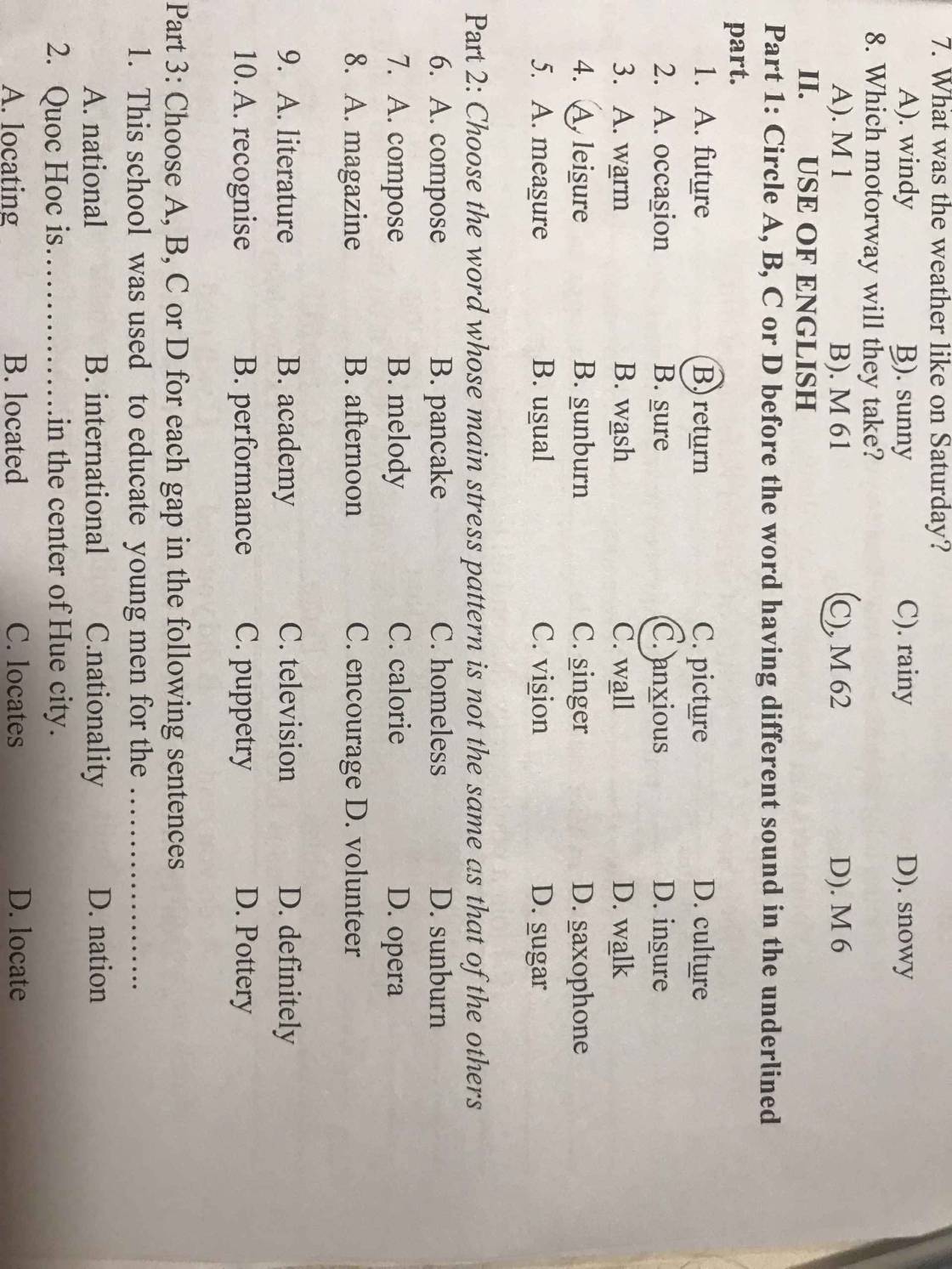
1 B
2 A
3 B
4 A
5 D
6 A
7 A
8 C
9 B
10 D
11 B
Đúng 1
Bình luận (0)
Choose the word which has a different sound in the part underlined2 điểmABCDXóa lựa chọnChoose the word which has a different sound in the part underlined2 điểmABCDChoose the word which has a different sound in the part underlined.2 điểmABCDChoose the word which has a different stress pattern from the others.2 điểmA. mineralB. vegetablesC. lemonadeD. tastyChoose the word which has a different stress pattern from the others.2 điểmA. turmericB. tomorrowC. fragrantD. noodleChoose the word which h...
Đọc tiếp
Choose the word which has a different sound in the part underlined
2 điểm
A
B
C
D
Xóa lựa chọn
Choose the word which has a different sound in the part underlined
2 điểm
A
B
C
D
Choose the word which has a different sound in the part underlined.
2 điểm
A
B
C
D
Choose the word which has a different stress pattern from the others.
2 điểm
A. mineral
B. vegetables
C. lemonade
D. tasty
Choose the word which has a different stress pattern from the others.
2 điểm
A. turmeric
B. tomorrow
C. fragrant
D. noodle
Choose the word which has a different stress pattern from the others.
2 điểm
A. volunteer
B. celebration
C. attention
D. independent
QUESTION 1: Choose the different sound of the underlined part * QUESTION 2: Choose the different sound of the underlined part * QUESTION 3: Choose the different sound of the underlined part * QUESTION 4: Choose the different sound of the underlined part *
Đọc tiếp
QUESTION 1: Choose the different sound of the underlined part *
QUESTION 2: Choose the different sound of the underlined part *
QUESTION 3: Choose the different sound of the underlined part *
QUESTION 4: Choose the different sound of the underlined part *
Xem thêm câu trả lời
SPEAKING Work in pairs. Which parts of the body in the list in exercise 2
1. are inside your body?
2. are part of your head or neck?
3. are part of your arm or hand?
4. are part of your leg or foot?
1. blood, brain, heart, intestine, kidney, lung, muscle, rib, spine, stomach
(máu, não, tim, ruột, thận, phổi, bắp thịt, xương sườn, xương sống, dạ dày)
2. cheek, chin, eyelid, eyebrow, forehead, jaw, neck, scalp, skull, throat
(má, cằm, mí mắt, lông mày, trán, hàm, cổ, da đầu, sọ, họng)
3. elbow, nail, shoulder, thumb, wrist
(khuỷu tay, móng tay, vai, ngón tay cái, cổ tay)
4. ankle, bottom, calf, knee, shin, thigh
(mắt cá chân, mông, bắp chân, đầu gối, ống quyển, đùi)
Đúng 0
Bình luận (0)




